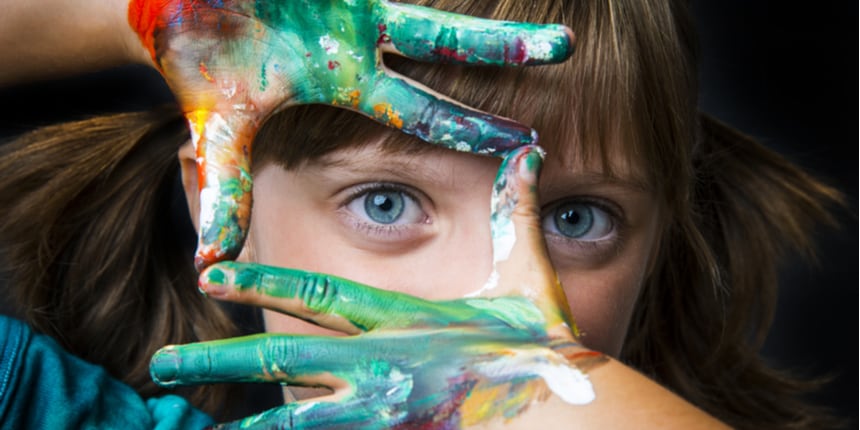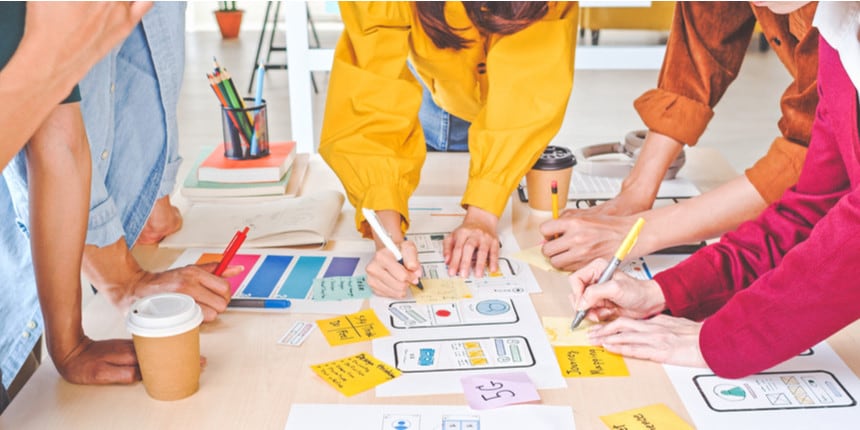How To Be Creative
Getting in touch with your creative side can be a hard nut to crack, especially if you don’t consider yourself a particularly creative person. Where some people feel free to explore and create as they wish, others might become pressurized at the thought of needing to be ‘creative’.

But creativity isn’t all a mystery that we make it to be. One issue with the way we commonly understand ‘creativity’ is the way we limit its meaning to only certain art forms, like drawing or painting. You may have noticed that a lot of times when the common person says “XYZ is a creative person”, the first thought that comes to our mind is that XYZ must be good at painting, drawing or some other fine art form.
However, if we open our minds a bit, we will see that there are examples of creativity all around us, in the movies we watch, the books we read, the music we listen to, the paintings we are drawn to, the food we find tasty, the interesting and unique ideas that people come up with, and whatnot. Even our gadgets, clothes and flower pots are a reflection of the people who designed them and their creativity. So, it won’t be an exaggeration to say that we all have a creative bone inside us, all that we need to do is explore and experiment a bit, to find out where exactly is it that our creativity lies.
So, if you want to know how to be creative and get your own creative juices flowing, here are a few things that you can benefit from.
See also:
How To Be More Creative - Give Yourself Permission To Be Imperfect
First things first, silence the inner critic. The best thing you can do to learn how to increase creativity is to get out of your own way and allow yourself to just do things. It doesn’t matter what you do, be it sketching, cooking, playing an instrument, coming up with business ideas, or even lego-building, as long as you do it without attaching a value judgment at the get-go. You can even try doing things ‘thoughtlessly’, or without thinking too much about them, and just going by your gut instinct. Criticism has its place in the creative process, but it is not in this early stage when you are learning how to be creative. So get started on things and feel free to do them, even if they don’t turn out great.
See also:
How To Be More Creative - Be Prolific
A tap that hasn’t been turned on for a long time will expel dirty water first. Only then can something purer flow out. That is true for creative things too, perhaps even more so. It is not enough to try just once and call it quits if you don’t like what you see. You’re going to have a whole lot of half-baked chimeric creations on your hands in the beginning. But make sure you finish them and move on to new things, trying to become better all the while. Going through that process alone will teach you how to improve creativity in yourself and come up with new and valuable project ideas and results.
Another way to learn how to be more creative is to challenge yourself with creative exercises. Here are a few ideas:
Flash fiction - These are very short stories with no more than 100 words. Writing flash fiction will force you to come up with a logical story from beginning to end and learn to convey all that’s necessary with limited words. You can write on just about anything or get flash fiction prompts from the web. Choose one that kindles something in you and get to work.
30-uses - This is a fun game that you can play with your friends as well. Take any object and ask everyone to list as many uses as they can think of. For instance, what can a single brick be used for? - As a paperweight, a weapon, a door-stopper, to store pencils, test gravity, feed birds, etc. Note that 30 is an arbitrary number here; the higher you can go, the better.
30-circles - Draw 30 circles, then turn them into as many self-contained drawings as possible in under a minute. Doing this will force you to stop questioning yourself and embrace different ideas. Take this challenge multiple times and try to break your previous records. This will improve your creative flow and get you more in touch with your natural creativity.
Doodle - Not a challenge, per se, but doodling is definitely a creative activity that we’ve all indulged in before. More than just a childish pastime, doodling is a way of keeping ourselves engaged with things that would otherwise bore us to death. It keeps the mind from wandering off so we can absorb more information, which can further fuel creativity.
Keep a notepad - Many writers keep a notepad to jot down their observations and capture ideas that come fleetingly in unannounced hours. You can follow in their footsteps and do something similar. It doesn’t have to be a physical notepad or a notepad at all. You can simply use your phone to record your ideas. The more you do it, the more you’ll learn how to improve creativity and get into the habit of recording your ideas, be they written down, recorded on the microphone, or sketched out.
See also:
How To Be More Creative - Snooze!
When you’re working on a creative project, there are going to be times when you reach an impasse and no further progress is possible. This is also what’s called the Incubation Stage. In such situations, it is best to step back from the problem and hit the snooze button.
Creativity is problem-solving at its heart and our mind is always looking for answers, even in our dreams. In fact, some of the biggest artists and scientists, from the Beatles to Albert Einstein, have credited their dreams for their breakthroughs. Working hard on a problem and then taking a break can lead to this sudden revelation, also known as the Illumination Stage, that can make you go aha!
Even a little time away from the project will help you refill your creativity well and return afresh. Instead of sleeping and taking naps, you can try doing anything else for a while as long as it is not too demanding, like going for a walk, watching television, or just taking a silent break. Boredom is good too. When the mind is free to wander off, it can connect seemingly disparate things together, which is what creativity essentially is. So don’t overburden yourself too much and let creativity arise naturally.
See also:
How To Be More Creative - Spend Time With Creative People
The fastest way to learn how to be creative is to simply surround yourself with creative people. These could be your friends or colleagues who are either in creative fields or are just naturally creative people. Being around them, you’ll get to see how they go about the whole creative process - from start to finish - and what it takes to live a creative life.
 Working With Creative Individuals
Working With Creative Individuals
Furthermore, because creative people are high in trait openness, you can be sure to have a lot of new ideas come your way. This will expose you to new and creative ways of thinking, and teach you how to increase creativity levels of your own. Another perk of spending time with creative people is that you will always be surrounded by creative endeavours and be motivated to pursue your own.
See also:
How To Be More Creative - Read More Often
Reading is one extracurricular activity that is of particular import when learning how to improve creativity. It allows one a peek into the mind of creative people and is, thus, the fastest way to get a sense of the creative process of different people and incorporate their techniques. Reading is beneficial for a host of other reasons as well, not least of which is patience and extended periods of focus, two key ingredients for any creative task. So read and read voraciously, and learn from the best among us.
How To Be More Creative - Exercise
A healthy mind lives in a healthy body, and this cliche couldn’t be truer for creativity. If your body isn’t in good shape, you are more likely to succumb to disappointments that inevitably come in any creative endeavour. You are also less likely to have the energy to focus for long periods of time.
Exercising and eating a healthy diet are essential to learning how to be creative. Even light exercises like jogging, cycling or doing yoga will do you a whole lot of good to get your mind active. So while you’re deeply engaged in your creative projects, do pay due attention to your body, eat well, and exercise regularly. Your body will thank you tenfold and keep you going.
See also:
How To Be More Creative - Skill Up!
Lastly, if you feel there’s much that you still need to learn about your field or craft, you can always look to level up your skills. Enrol in courses that will not only teach you advanced skills but also brush up your basics. You can also sign up for courses that particularly focus on honing your creative skills and teach you how to improve creativity levels of your work.
See also:
Everyone can learn how to be creative, no matter how uncreative they might think themselves to be. Even if you don’t have a creative bone in your body, the tips mentioned in this article should help you get a sense of what the process of creativity feels like and the things that you can do to know how to increase creativity output. We hope you all the best in your creative efforts.
Read more:
Shashwat Khatri is a psychology graduate. He is a content developer with Careers360.
Frequently Asked Questions (FAQs)
Yes, you can teach yourself to be creative by taking up creative challenges, switching off the inner critic, and aiming for quantity over quality.
To improve your creativity skills, allow yourself to be imperfect, spend time with creative people, open yourself up to new ideas, and learn all that you can along the way.
Some people are naturally more creative than others which may indicate that creativity is a talent. But it can also be learnt.
The act of being creative starts out as an attitude but, with enough practice and time, can be developed as a dependable skill.